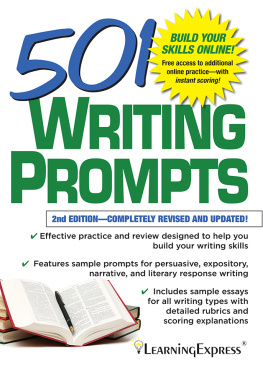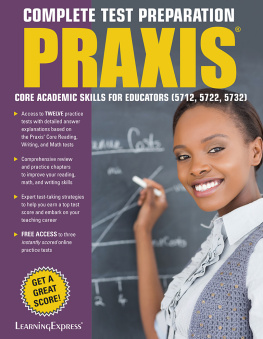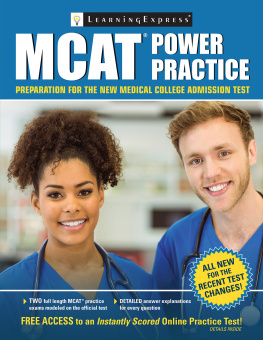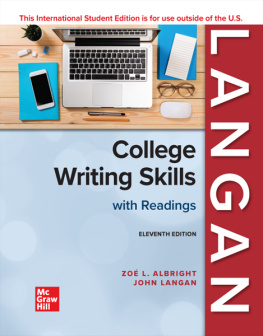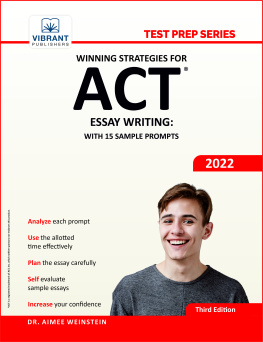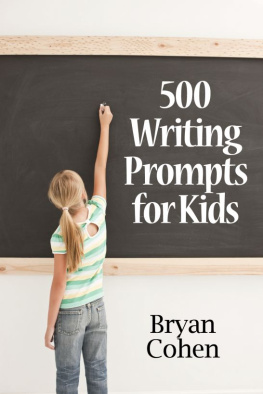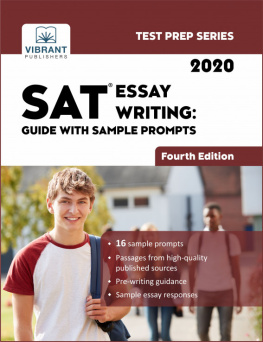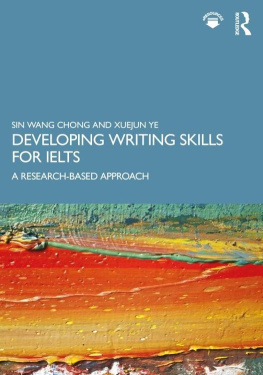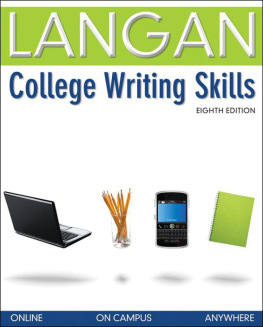Copyright 2014 LearningExpress, LLC.
All rights reserved under International and Pan-American Copyright Conventions. Published in the United States by LearningExpress, LLC, New York.
Cataloging-in-Publication Data is on file with the Library of Congress.
Printed in the United States of America
9 8 7 6 5 4 3 2 1
Second Edition
ISBN 978-1-57685-968-1
For more information or to place an order, contact LearningExpress at:
80 Broad Street
4th Floor
New York, NY 10004
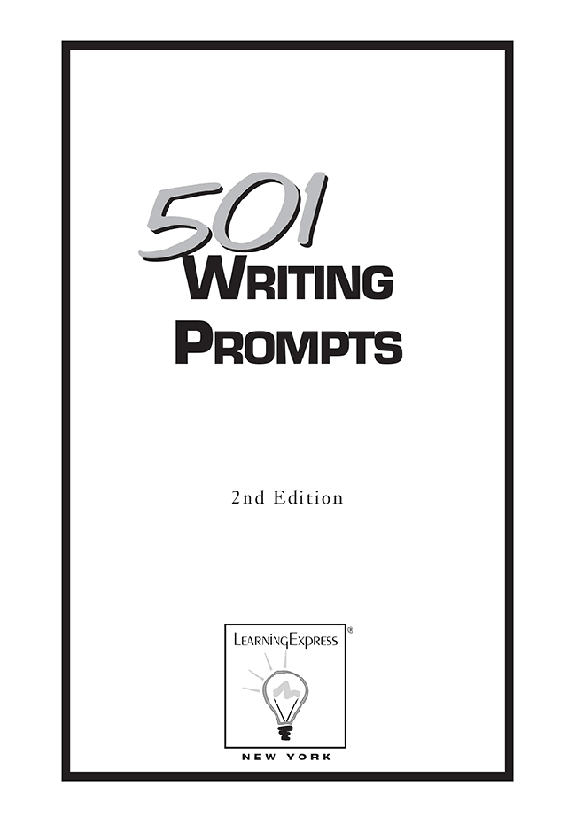
Introduction
Welcome to 501 Writing Prompts! This book is designed to provide you with a variety of writing topics and model essays. Categories in this book cover many different types of writing: persuasive, expository, narrative, and literary response. At some point in your life, whether you are trying to pass an academic exam or standardized test, writing a college placement essay, or vying for a job promotion, you will need to practice the skills used to express yourself clearly.
How to Use This Book
First, decide on the type of essay you will need to write. There are four types of writing that are commonly used in a given situation. Persuasive writing argues a point and is often called argumentation. When you write persuasively, you are always expressing an opinion. In order to convince your reader, you must be able to present sound reasons and good examples. For instance, instead of explaining the causes of the Civil War, you might be asked to persuade your reader that the Civil War was more about the economics of the southern plantation system than the social issue of slavery. Persuasive writing and language is often found in editorials, letters of complaint, or proposals. Expository writing is explanatory. You select information from oral, written, or electronic text and organize it to show that you understand a concept. Expository writing is the type of writing you create for term papers, essays, or letters. Most standardized tests often include an expository prompt. Narrative writing is a type of writing that requires you to tell a story that describes an event or relates a personal experience. A good narrative should have convincing characters, a plot, and a theme. You may be asked to write a narrative of personal experience on your college placement essay. If you write a literary response essay, you will have to read and analyze a piece of literature and then make comments based on the literal and implied interpretations of the text. If you are taking a state assessment test, you may find yourself facing a literary response essay.
Second, learn how to score your essay. For your reference, there is a scoring guideoften called a rubricin each chapter of this book. To determine your score, simply refer to the categories on the scoring guide to see how your writing measures up. If you have difficulty figuring out your score, ask someone knowledgeable, like a teacher, counselor, writing coach, college professor, or even your boss, to help you.
And last, check some of the model essays provided in this book. There are sample essays available for all of the bold-faced prompts throughout the book. The samples provide a look at a top essay, a middle-of-the road essay, and a low-scoring essay. You can use these as benchmarks to compare and contrast your writing.
Make a Commitment
If you are willing to practice your writing skills, you have already taken an important step toward improving your writing. As you work through some of the prompts in this book, you may feel confident in your attempts. However, if you feel that you need more instruction before you tackle some of these writing assignments, refer to some of the other LearningExpress titles: Writing Skills Success in 20 Minutes a Day, 5th Edition or 501 Grammar and Writing Questions, 4th Edition . A basic knowledge of language will also help you become a better writer. Use these books to get the extra practice you need: Grammar Success in 20 Minutes a Day, 3rd Edition or Vocabulary and Spelling Success in 20 Minutes a Day, 5th Edition.
Chapter 4
Literary Response Prompts
Choose one of the literary response prompts from the list below and write an essay. A certain number of prompts have model essays in the answer section that you can use to compare and contrast your writing.A scoring guide or rubric is also included in the answer section.You can use this guide to give you an idea of the way your essay may be graded. If you have trouble interpreting the scoring guide, see a teacher or professor for help. Sample responses to the prompts in bold can be found at the end of the section.
Tone is the mood or feeling the author intends the reader to experience. Using a specific piece of literature, explain how tone enhances the work.
Poetry has been defined as, putting the best possible words in the best possible order. Explain what this means and apply this theory to a specific poem.
American Beat generation poet Jack Kerouac has embraced other religions and non-western philosophies that can be evidenced in his work. Explain/discuss how this is apparent to his readers. Use specific evidence in your answer.
Often in literature, there is a heroic figure, or archetype. Discuss the characteristics of an archetype, using specific examples from a piece of literature.
In the novel, The Lord of the Flies , by William Golding, a group of boys are stranded on a remote island to fend for themselves. Compare/contrast this novel to the popular television show Survivor. Use specific details in your answer.
The poet Emily Dickinson once said that her sensitivity was comparable to missing a layer of skin. Explain how this analogy is reflected in her poetry.
Using a specific literary work, explain how a novel might influence change in society.
The theme of a literary piece is the central idea or message that it delivers. Cite a specific literary work and discuss the theme.
Anne Frank became famous for keeping a diary during her experiences in the Holocaust. Explain how simply keeping a diary gave Anne such worldwide recognition.
Write a lengthy, detailed journal entry from the point of view of someone you have studied in history. Include accurate, historical details in the diary entry.
Compare/contrast the fear of terrorism and the concern with safety issues in present day society with George Orwells novel, 1984.
A haiku is a three-line, non-rhyming poem usually centered on nature. It has also been defined as a snapshot of something ordinary. From your own experience, describe the natural images you feel are worthy of a haiku.
A struggle between two or more opposing forces in a work is called conflict. Cite a piece of literature and explain the conflict embodied in the work.
Personification is the technique wherein a non-human character is given human thoughts, feelings, and dialogue. Illustrate how this technique is used in your favorite novel or short story.
Walt Whitman uses second-person narrationa technique not often used by writersin his poem Crossing Brooklyn Ferry . In second person narration, the narrator speaks directly to you. Discuss another work that uses second person narration. Give examples from the work.
The setting of a novel is where the action takes place. Explain how the setting complements the story in a novel you have read.
The climax of a work is when all of the events come to a breaking point. Using a piece of literature that you know, explain the events that lead to the climax, what happens at the climactic scene, and how the story changes after the climax.
Third person point of view is when the narrator has no part in the action. He or she is simply telling the story using the words he , she , or they . A story would be very different if it were told from the first person (using the pronoun I ) point of view. Using a novel written in the third person, discuss how it would be a very different story if it were told in the first person.
Next page
